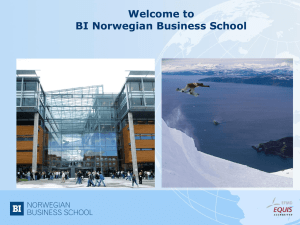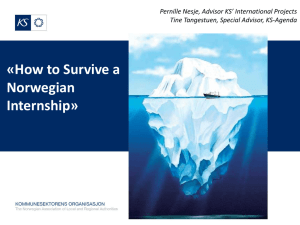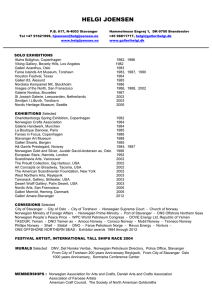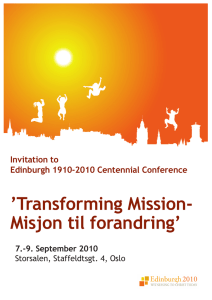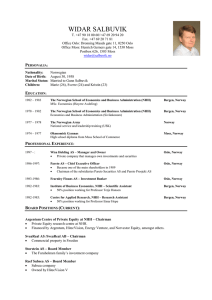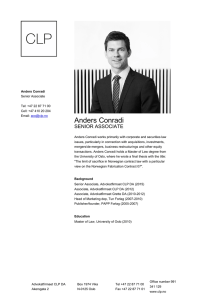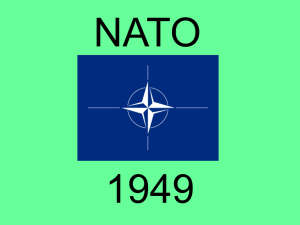PROGRAM
advertisement
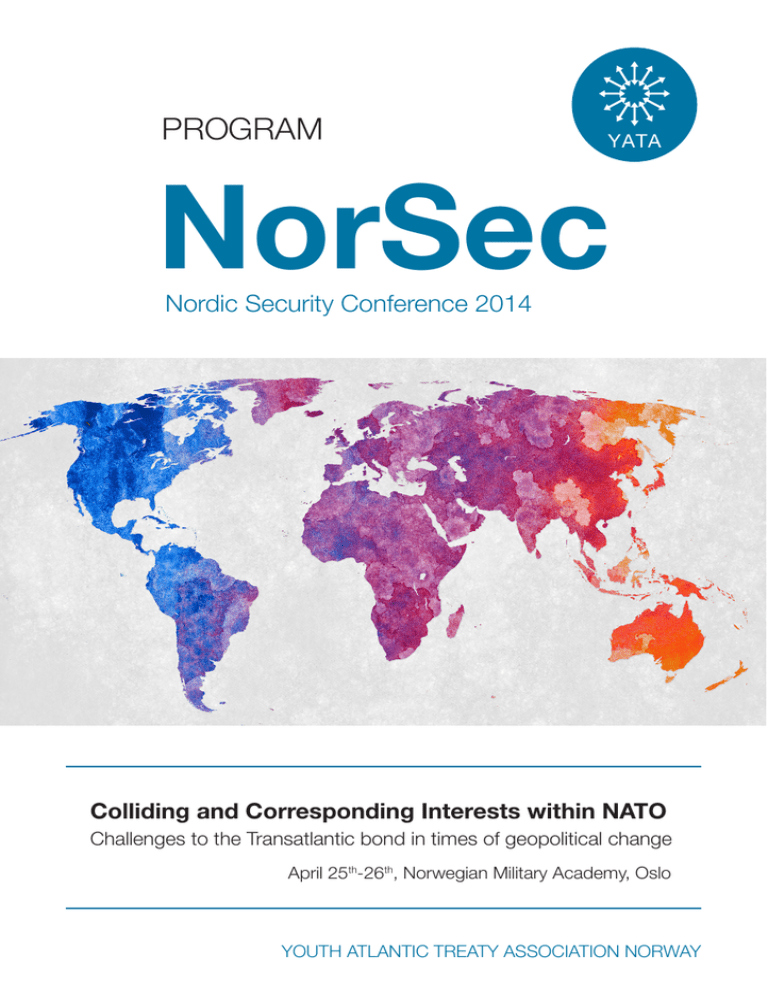
PROGRAM YATA NorSec Nordic Security Conference 2014 Colliding and Corresponding Interests within NATO Challenges to the Transatlantic bond in times of geopolitical change April 25th-26th, Norwegian Military Academy, Oslo YOUTH ATLANTIC TREATY ASSOCIATION NORWAY Youth Atlantic Treaty Association Norway is a network of young professionals, students and cadets, raising awareness on topics of security, defence and foreign policy. YATA Norway is under the Norwegian Atlantic Committee (DNAK) and is politically independent. At the core of the organisation are our 40 passionate volunteers across the country: The two local chapters, YATA Trondheim and YATA Bergen, in addition to the board situated in Oslo. YATA Norway throws events like embassy visits and lectures from politicians, military figures and scientists, as well as visits to military bases and workshops. We have around 450 members nationally. Read more and become a member at yata.no Like us on facebook.com/yatanorway Follow us at @Yata_no NorSec 2014 - Colliding and Corresponding Interests within NATO 2 WELCOME TO NORSEC 2014! 2014 marks an important year for NATO. Not only is it the 65th anniversary of the Alliance. It is also 20 years since the Alliance first opened its doors to new states, beginning with the Partnership for Peace-program, and followed by new member states through the three subsequent post-Cold war enlargements 15, 10 and 5 years ago. New enlargements will follow, but not on the upcoming NATO Summit in Wales, where extended global partnerships will be a main priority. When the current 28 NATO members meet in Cardiff September 4th – 5th, the focus will be on the future of an Alliance that after 13 years is withdrawing from Afghanistan (ISAF) and thereby ending almost 20 years of continuous international military operations “out of area”. NATO’s engagement in Afghanistan has to many observers been seen as the alliance’s raison d’être. Military power is only effective when its operational, seems to have been the common knowledge. But as the Alliance demonstrated throughout the Cold War, a credible and flexible military power was a highly effective tool to deter an enemy. And the whole point with the Cold War was to prevent it from becoming warm! As George Kennan once put it: if you can’t treat communist Russia and China as friends, the conflict can be handled by acknowledging your divergent interests through constant vigilance and by securing the strength in our own democratic institutions. Let’s never forget that NATO originally was created to defend personal liberty, democracy and the rule of law (Art. 2). This is still a relevant leading star! We are indeed living in challenging times. We are facing a world in rapid transformation. In the East, China is rising and changing the regional power balance as well as the weight of its own voice in international affairs. The US is devoting greater attention to South East Asia and the Pacific. Europe is still NorSec 2014 - Colliding and Corresponding Interests within NATO 3 struggling with an economic, social and political crisis that has split north from south and caused nationalistic reactions in many EU-countries. Russia is playing with the European map - again. In Ukraine the political borders has been changed by the use of military force. Will the Russian land grab revitalise the transatlantic partnership so crucial to NATOs survival? Will we end up with a new Cold War? Will this crisis bring the Americans back to Europe? Will it increase Europeans willingness to pay for its own defence? Will it strengthen the European component of NATO or give a new impetus to build an “autonomous” CESDP? These are all questions that will be raised and discussed by you at this year’s NorSec. And these are also questions that will be on the agenda for NATOs next Secretary General who for the first time in the Alliance history will be a Norwegian: Jens Stoltenberg! Let’s congratulate him. But also remind him of the complex agenda he is facing. I am sure that you will do your best to help him! NorSec 2014 is a unique opportunity to take into account the diversity of the alliance, the complexity of the decisions that are to be made, and the opportunities and challenges that lie ahead. I am pleased to see that NorSec attracts so many young people from so many different countries, and I am confident that by the end of your days here, you will have gained a greater understanding of what it will entail when NATO is coming home. Good luck, Kate Hansen Bundt, Secretary General, The Norwegian Atlantic Committee NorSec 2014 - Colliding and Corresponding Interests within NATO 4 WELCOME FROM YATA NORWAY On behalf of YATA Norway, it is my great pleasure to welcome you all to the Nordic Security Conference 2014! It has been months of planning and we are overwhelmed by the positive interest in our conference. We started out with the goal that this year’s conference should highlight the future challenges facing NATO; challenges that are posed by external forces but also those posed by conflicting interests within Europe. How can NATO remain a cohesive and relevant alliance in the years to come? The recent events in Ukraine have shown that NATO is still an important actor in Europe, but the question still remains how We are delighted to have participants from all over Norway, Europe, USA and Canada. We hope that NorSec 2014 will be successful in giving people from different parts of the world the opportunity to discuss the important topics brought up in the conference and most of all, that the participants will have fun doing so! Enjoy the conference! Best wishes, Helene Kvam Sigmond, Conference manager NorSec 2014 & Vice-President YATA Norway NATO shall position itself in the international community post2014. NorSec 2014 - Colliding and Corresponding Interests within NATO 5 PROGRAM Day 1 – Friday 25 April 09:15 - 09:20 Words of welcome by YATA Norway 09:20 - 09:30 Words of welcome by Chief of the Norwegian Military Academy, Colonel Ingrid Margrethe Gjerde 09:30 - 09:55 Opening lecture by the Royal Norwegian Minister of Defence, Ine Eriksen Søreide 09:55 - 10:25 Keynote lecture by Prof. Dr. Janne Haaland Matlary, University of Oslo 10:25 - 10:35 Coffee break 10:35 - 11:00 The Future Role of the US in NATO by Asle Toje, Norwegian Nobel Institute. 11:00 - 11:25 Core Area Initiative by Henning Vaglum, Royal Norwegian Ministry of Defence 11:25 - 11:35 Q&A 11:35 - 12:15 Lunch 12:15 - 12:40 NATO and Norwegian Security by Commodore Jacob Børresen 12:40 - 13:05 EU and NATO Security Cooperation by Prof. Dr. Luis Simon, Institute for European Studies NorSec 2014 - Colliding and Corresponding Interests within NATO 6 13:05 - 13:30 Southern Europe - EU and NATO by Dr. Spyros Economides, London School of Economics 13:30 - 14:00 Q&A and panel discussion 14:00 - 14:15 Coffee break 14:15 - 14:40 Eastern Europe by Helene Forsland Widerberg, Norwegian Institute of Defence Studies (IFS) 14:40 - 15:05 Ukraine by Tor Bukkvoll, Norwegian Defence Research Establishment (FFI) 15:05 - 15:30 Russia and NATO Relations by Pavel K. Baev, Peace Research Institute Oslo (PRIO) 15:30 - 16:00 Q&A and panel discussion NorSec 2014 - Colliding and Corresponding Interests within NATO 7 Day 2 – Saturday 26 April 09:30 - 09:55 Sweden’s Neutrality by Oscar Jonsson, King’s College 09:55 - 10:20 The High North: Security Cooperation in the Arctic by Katarzyna Zysk, Norwegian Institute for Defence Studies (IFS) 10:20 - 11:00 Lunch 11:00 - 11:25 Coming into the Cold: Asian Arctic Interests by Per Erik Solli, Norwegian Institute of International Affairs 11:25 - 11:50 Cyber Security and Defence by Lt. Colonel Thomas L. Halvorssen, Norwegian Cyber Force 11:50 - 12:20 Q&A and Panel Discussion 12:20 - 15:00 Workshop Group 1: Oscar Jonsson, King’s College Group 2: Andreas Østhagen, Norwegian Institute for Defence Studies Group 3: Ingvill Moe Elgsaas, Norwegian Defence Research Establishment Group 4: Bjørn Olav Knutsen, Norwegian Defence Research Establishment 14:00 - 14:20 Coffee Break 15:00 - 16:00 Presentations by groups NorSec 2014 - Colliding and Corresponding Interests within NATO 8 SPEAKERS’ BIOGRAPHIES In order of appearance Ine Eriksen Søreide is the Norwegian Minister of Defence. She represents the Conservative Party (Høyre), and is elected to parliament from the constituency of Oslo. Her parliamentary experience includes serving as chair of the Standing Committee on Foreign Affairs and Defence, as well as Chair for the Enlarged Foreign Affairs Committee. She has also served as Head of the Delegation for Relations with the European Parliament, and Head of the European Consultative Committee. She holds a Cand. Jur. degree from the University of Tromsø. Janne Haaland Matlary is Professor of political science at the University of Oslo, as well as at the Norwegian Defense College. She was a researcher at the Norwegian Institute of International Affairs 1987-1992, Research Director at ARENA, Center for European Studies at the University of Oslo 1995-1997, and Deputy Minister of Foreign Affairs 1997-2000. Matlary’s research interests include international relations and international security policy, with a special focus on European Security Policy. Her latest books are (with Magnus Petersson) NATO’s European Allies: Military Capability and Political Will (Palgrave 2013) and (as co-editor) Strategisk Suksess? Norsk Maktbruk I Libya og Afghanistan (Transl: Strategic Success? Norwegian use of force in Libya and Aghanistan, Universitetsforlaget, 2013). Asle Toje is Research Director at the Norwegian Nobel Institute in Oslo, and has been a lecturer at the Institute for Political Science at the University of Oslo. Toje’s research interests are found at the intersection of security studies and European studies. Since graduating from Cambridge University in 2006, Toje has published widely on European security and foreign policy. Among his latest works are America, the EU and Strategic Culture: renegotiating the transatlantic bargain (London, Routledge); The European Union as a Small Power: After the Post-Cold War (London, Macmillan, 2010) and Neoclassical realism in Europe (Manchester University Press, 2012). NorSec 2014 - Colliding and Corresponding Interests within NATO 9 Henning Vaglum is Director General for the Department of Security Policy at the Royal Norwegian Ministry of Defence. He has formerly held the position as Defence Advisor for the Norwegian Delegation to NATO, and he has also been the Deputy Director General for the Transatlantic and European Security Policy at the same department for which he now is Director General. Vaglum graduated from John Hopkins University, School of Advanced International Studies, with an MA in International Relations and Strategic Studies. Commodore Jacob Børresen (ret.) has served a long military career in the Royal Norwegian Navy, where he last held the position as Chief of the Navy Staff. He has previously served as the military secretary to the Minister of Defence and has also held a position at SHAPE as Assistant Director of Operations for Bosnia, Operation Joint Endeavour. Commodore Børresen has been widely published on topics of security and defence questions and was also the co-author of the books on Norway's official defence history. He is now an independent consultant on matters of Norwegian defence and security policy. Prof. Dr Luis Simon is a Research Professor in European Security at the Institute for European Studies (Vrije Universiteit Brussel). He is also a cofounder and senior editor of the website European Geostrategy. He holds a PhD from Royal Holloway College (University of London) and a Masters degree from the Institute d’Etudes Politiques de Paris. Since February 2012, Luis has been providing advise on strategic affairs to the Office of the Spanish Minister of Defence. Between September 2012 and April 2013 he has been a Visiting Fellow at the Saltzman Institute of War and Peace Studies (Columbia University). His current research includes the evolution of U.S. force posture and defence strategy and its impact upon transatlantic relations; changing geostrategic dynamics in Asia and their implications for Europe. Other research interests include NATO, the EU’s Common Security and Defence Policy and the security and defence policies of Britain, France and Germany. NorSec 2014 - Colliding and Corresponding Interests within NATO 10 Dr. Spyros Economides is Senior Lecturer in International Relations and European Politics in the European Institute at the London School of Economics, and Deputy Director of the Hellenic Observatory. He received the Robert Mackenzie Prize for his doctoral thesis on The International Implications of the Greek Civil War. His subsequent work has concentrated on the international affairs of Southeastern Europe and EU external relations. He was a Research Associate of the Centre for Defence Studies at King's College and at the International Institute for Strategic Studies in London. He was a Visiting Professor of Government at Dartmouth College, USA. And acted as Specialist Adviser to the House of Lords EU Committee in its report, 'Responding to the Balkan Challenge: The Role of EU Aid'. His publications include UN Interventionism: 1991-2004 (edited with Mats Berdal, 2007) and The Economic Factor in International Relations (with Peter Wilson, 2001). He is currently writing on the EU's Balkan experience since 1991. Helene F. Widerberg received her MA in political science at the University of Oslo in 2005. From 2009 to 2013 she worked as a research fellow at the Norwegian Institute for Defence Studies, Norwegian Defence University College. In a two-year project she examined how allies (Norway, Poland and Lithuania) who share an overall goal – strengthened emphasis on collective defence in the 2010 revision of NATO’s strategic Concept – chose different tactics. The study was based on interviews at NATO headquarters and relevant capital cities, observations of the behaviour of the three states and inspection of written communications. She works as a project coordinator in the Department for Security Policy and North America at the Norwegian Ministry of Foreign Affairs (2013–). Tor Bukkvoll has studied political developments in Russia and Ukraine since the mid-1990s, especially in the areas of defence and security. He speaks Russian and Ukrainian, and obtained his PhD from the Norwegian University of Science and Technology. Bukkvoll has spent much time in Russia and Ukraine. Bukkvoll was a visiting research fellow at the Changing Character of War program at the University of Oxford in 2008, worked as an associate professor of international relations at the Norwegian Military Academy NorSec 2014 - Colliding and Corresponding Interests within NATO 11 between 1996-1999, and has previously worked at Fafo Institute for Applied International Studies as well as the Peace Research Institute of Oslo (PRIO). Pavel Baev is a Norwegian political scientist and security scholar. He is currently a research professor at the Peace Research Institute Oslo (PRIO) and a senior non-resident fellow at the Brookings Institution (Washington, DC). Baev graduated from Moscow State University (M.A. in economic and political geography, 1979) and worked in a research institute in the USSR Ministry of Defence. He received his PhD in international relations from the Institute for US and Canadian Studies in Moscow in 1988, then worked in the newly created Institute of Europe in Moscow until 1992, when he moved to Oslo, Norway and joined PRIO. In 1994-1996, he held a 'Democratic Institutions Fellowship" from NATO. From 1995-2001, Baev was co-editor of the academic journal Security Dialogue, and from 1999-2005 he was a member of the PRIO board. Baev's current research includes the transformation of the Russian military, Russo-European Union relations, Russian energy policy, Russian policy in the Arctic, and terrorism and conflict in the Caucasus. He is a member of the PONARS Eurasia program, currently located at the Institute for European, Russian, and Eurasian Studies at the Elliot School of International Affairs, George Washington University. Baev is the author of several books and academic articles and he is a regular columnist in the Eurasia Daily Monitor published by the Jamestown Foundation. Oscar Jonsson is a PhD candidate at the Department of War Studies, King's College London. His research focuses on how technological innovation is changing the understanding of war and warfare in Russian military theory. He gained his MA in International Peace and Security (Distinction) from the Department of War Studies, King’s College London and a BA in Peace and Conflict Research from Uppsala University. He has earlier worked for the EU Institute for Security Studies in Paris and in the Swedish Armed Forces. NorSec 2014 - Colliding and Corresponding Interests within NATO 12 Dr. Katarzyna Zysk is Associate Professor at the Norwegian Institute for Defence Studies/Norwegian Defence University College in Oslo. Zysk is also a member of the Arctic Security Initiative at Hoover Institution, Stanford University and she serves as a research scholar (non-resident) at the US Naval War College, Center for Naval Warfare Studies - Strategic Research Department (since 2011). Zysk has published monograph, book chapters, articles and reports and has contributed in the media on a variety of topics including Arctic security, Russia's security and defence policy, maritime security, transatlantic relations, European security, and diplomatic history. Among her recent works is a post-doctoral research project on security developments in the Arctic, with special focus on Russia's policies. The project was a part of the international research programme "Geopolitics in the High North" (2008-2012) and resulted in a number of publications that appeared in Arctic Circumpolar Security in an Age of Climate Change (Cambridge University Press, 2011), Emerging Naval Powers in the 21st Century: Cooperation and Conflict at Sea (Routledge, 2012), The FastChanging Maritime Arctic: Defence and Security Challenges in a Warmer World (University of Calgary Press, 2013), and others. Zysk earned her PhD (2006) and MA (2002, with distinctions) in international relations and history from Nicholas Copernicus University, Institute for International Relations in Torun, Poland. Her current research focuses on international security and strategic studies, including military innovation in Russia, Russia's Arctic policies and relations with Asian countries, as well as security and international order at sea in the Arctic. Per Erik Solli is Colonel in the Royal Norwegian Air Force and is currently a senior military advisor at the Norwegian Institute of International Affairs (NUPI). He has an MA in International Relations Pi Sigma Alpha from Auburn University, a Master in Military Operational Art and Science from the U.S. Air Force Air Command and Staff College, and a bachelor in Social Science from the Norwegian Air Force Academy. His recent and current research projects are Asian interest in the Arctic, security challenges in the Arctic, regional perceptions of global security, national cyber security, geopolitical changes and access to the global commons, and operational access for military NorSec 2014 - Colliding and Corresponding Interests within NATO 13 operations. Solli was recently visiting fellow at strategic studies institutes in Singapore and in Washington. Andreas Østhagen is a fellow at the Norwegian Institute for Defence Studies (IFS) in Oslo. He also serves as an analyst at The Arctic Institute. Before returning to Oslo, he was the acting director, and before that an advisor, at the North Norway European Office in Brussels. Previously he has worked on Arctic and security issues at the Centre for Strategic and International Studies (CSIS) in Washington D.C., as well as the Walter & Duncan Gordon Foundation in Toronto. Østhagen holds a Master of Science (MSc) from the London School of Economics (LSE) in European and international affairs. Ingvill Moe Elgsaas has an M. Phil. in Russian and East European Studies from the University of Oxford and a B.A in Cultural and Social Sciences from the University of Bergen. Her academic background is rooted in linguistics and area studies focusing on Russia. She is currently enrolled in the Ph.D. program for Political Science at the Norwegian University of Science and Technology (NTNU). Moe Elgsaas is writing her Ph.D. on power relations in the Russian Federation and the Murmansk Region at the Norwegian Defense Research Establishment (FFI) within the framework of FFI’s Russia program. Bjørn Olav Knutsen is senior researcher at the Norwegian Defence Research Establishment (FFI) with European security issues as his main field of research. He has previously been a guest researcher at the EU Institute for Security Studies (EU-ISS) in Paris and also guest researcher at the Norwegian Nobel Institute in Oslo. He has published widely in both national and international journals and the latest one “NATO mellom samhold og lagdeling” (NATO between cohesion and a multi-layered alliance) will appear in the book “Norge i internasjonale operasjoner” (Norway in international operations), Universitetsforlaget, 2014. NorSec 2014 - Colliding and Corresponding Interests within NATO 14 CONFERENCE PARTICIPANTS Surname Name Affiliation Abdli Maria Science Po Paris / NRK Almassy Karwan University of Oslo Andresen Øystein Næss YATA Norway, Røyken Kommune Appelman Rowinda President YATA International Austad Ida Johanne NTNU Bengtsen Fredrik YATA Trondheim, NTNU Berezkova Vita Amnesty International, Århus University Bergo Aleksander YATA Norway Member Blicher Sara The Danish Atlantic Committee Bowitz Tollak Nylænde University of Oslo Bråten Dennis Palij University of Oslo Burggraaff Jannick YATA Netherlands Dahl Isabella Norwegian Police University College Dahle Marie Harbo University of Oslo Danielsen Mads A University of Oslo Dimitrov Martin University of Glasgow Durfee Sean University of British Colombia Dyvesether Natalie M YATA Trondheim, NTNU Dzigal Lamija University of Vienna, Intern OSCE Dørum Olav Hoel Doctors Without Borders Eckhoff Christopher William Tveitan Buskerud and Vestfold University College Eggen Karen-Anna University of Oslo Endal Lars YATA Bergen, University of Bergen NorSec 2014 - Colliding and Corresponding Interests within NATO 15 Eriksen Ellen Brehme European Youth, Norwegian Young Conservative Fazlic Daniel Vice-President YATA International Foss Eli YATA Alumni, Norwegian National Rail Administration Gaasemyr Torunn YATA Norway Gundersen Gullik Strand Hølmebakk University of Oslo Guney Eda YATA Turkey Hagen Fredrik Julian Lie University of Oslo Halvorssen Thomas L Norwegian Cyber Force Hegre Ivar University of Oslo Hindbjørgmo Agnethe Thun Norwegian Young Conservative Hodnefjeld Axel University of Oslo Holmås Ragnhild President, YATA Norway Holthe Ingrid Dragland University of Oslo Hurum Kari YATA Trondheim, NTNU Husøy Haakon YATA Norway, Norwegian Army Isdal Julie University of Oslo, Norwegian Army Kavli Håkon Voldmo NTNU Klepo Nani YATA Croatia Knudsen Maria Mundt YATA Denmark Kofoed Marianne Svendsen University of Oslo Koliasta Maria Trainee at European Parliament Kraglund Bjørn YATA Norway Member Kvelland Even Scafrio Langenhuijzen Sander YATA Netherlands Lisii Cristina University of Sheffield, UK NorSec 2014 - Colliding and Corresponding Interests within NATO 16 Lobo Sean Norwegian Ministry of Foreign Affairs Lund Peder President YATA Trondheim, NTNU Manninen Antti-Pekka Student of Law and Political Science Myrflott Idun Norwegian Army Nilsen Mats Ofrim University of Oslo Nilsson Carl Hvenmark US Embassy in Stockholm Notø Sebastian Bjørknes College Nøkling Oscar University of Oslo Osorio Christian Garzon University of Oslo Ovesen Cecilie Falch YATA Denmark Przybyll Anna Warsaw University Pulkkinen Kaisa Research coordinator at Swedish Institute for International Affairs Reng Jeppe Mariegaard The Danish Atlantic Committee Rohatgi Manvi University of Oslo Sandness Julie YATA Norway Sekulovic Saba YATA Montenegro Seyffert Matthew Franklin University Switzerland Shut Darya YATA Norway Shvydchenko Viktoriia Sigmond Helene Kvam Silva Miguel Nunes YATA Portugal Skjeggestad Sunniva YATA Bergen University of Oslo and Bergen Smidt Martin University of Oslo Sneberg Cathrine University of Oslo Sparre Magnus University of Oslo Vice- President of Public Diplomacy of Youth Atlantic Council, Ukraine NorSec manager, Vice-President of YATA Norway NorSec 2014 - Colliding and Corresponding Interests within NATO 17 Spasovski Andrej YATA Macedonia Staff Ellen Wilmann YATA Norway University of Oslo Stajic Dalibor Stemre Morten Stenehjem Karl YATA Bergen, University of Bergen Suardi Stefano YATA Italy Thornqvist Oskar J.K. BI Oslo Thorsen Magnus Vestby YATA Norway, University of Oslo Tonisson Ernst-Armin Lund University Trafford Mick Royal Marines Officer, UK Ministry of Defence Villa Karoline University of Oslo Voll Bjørn Ivar University of Oslo Voo CJ Kevin Uppsala University Wengen Linn-Aurora YATA Norway, University of Oslo Werner Julian YATA Germany Wiik Jørgen University of Oslo Wilcox Tine E.L Norwegian Young Conservatives Yende Ntokozo Ziekenoppasser Lisa Ziolkowski Marte Norwegian Atlantic Committee Øines Nils Nesbu Highscool Østby Anders University of Oslo Zentrum für Europäische Friedensund Sicherheitsstudien (ZEUS) YATA alumni, Embassy of the Republic of Korea United World College, Red Cross Nordic Leiden Law School, Netherlands Defence Academy NorSec 2014 - Colliding and Corresponding Interests within NATO 18
